MegaCLI 工具的使用
一、Megacli介绍
工作中偶尔会用到MegaCli这个工具,之前的博文里面也提到过这个工具,这里对于用法详细的记录一下。
通过LSI公司提供的MegaCli工具, 可以实现对RAID卡和硬盘的监控。
2013年12月: Avago公司以66亿美元收购LSI,2015年5月: Avago公司以370亿美元收购博通,因为MegaCLI 工具原来是LSI的,所以现在官方的下载地址也发生了变化。
1.1、下载与安装
线上使用的工具一定要确保来源的安全,尽量官网下载,虽然可能在找的时候稍微有点麻烦。如果有些技巧的话,可能会稍快,下面说两种方式。
第一个下载方式:
http://www.dell.com/support/article/cn/zh/cndhs1/SLN292232 #通过dell官网进行搜索找到包含有下载链接的页面
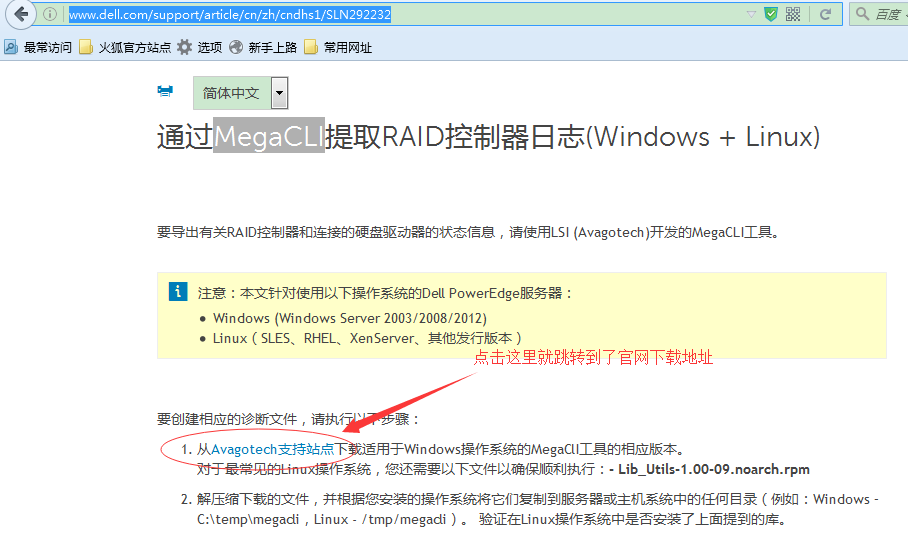
第二种下载方式:
https://www.broadcom.com/support/download-search #进入官网搜索页面,这是官网跳转过来的搜索页面
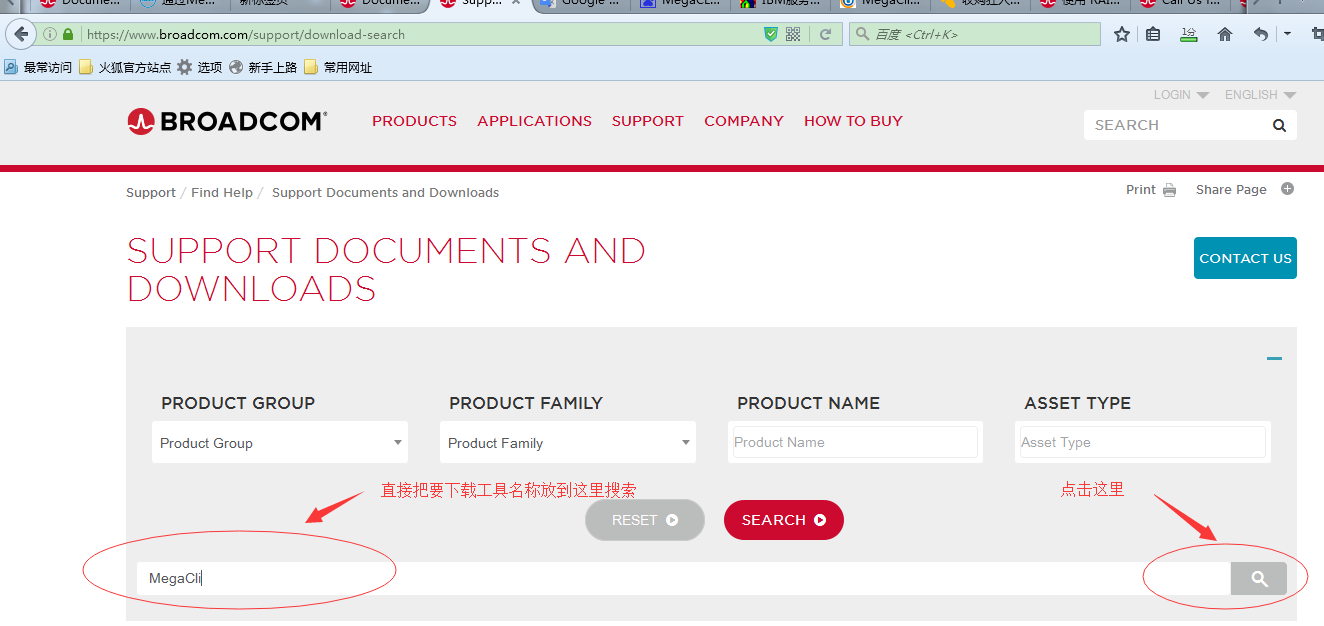
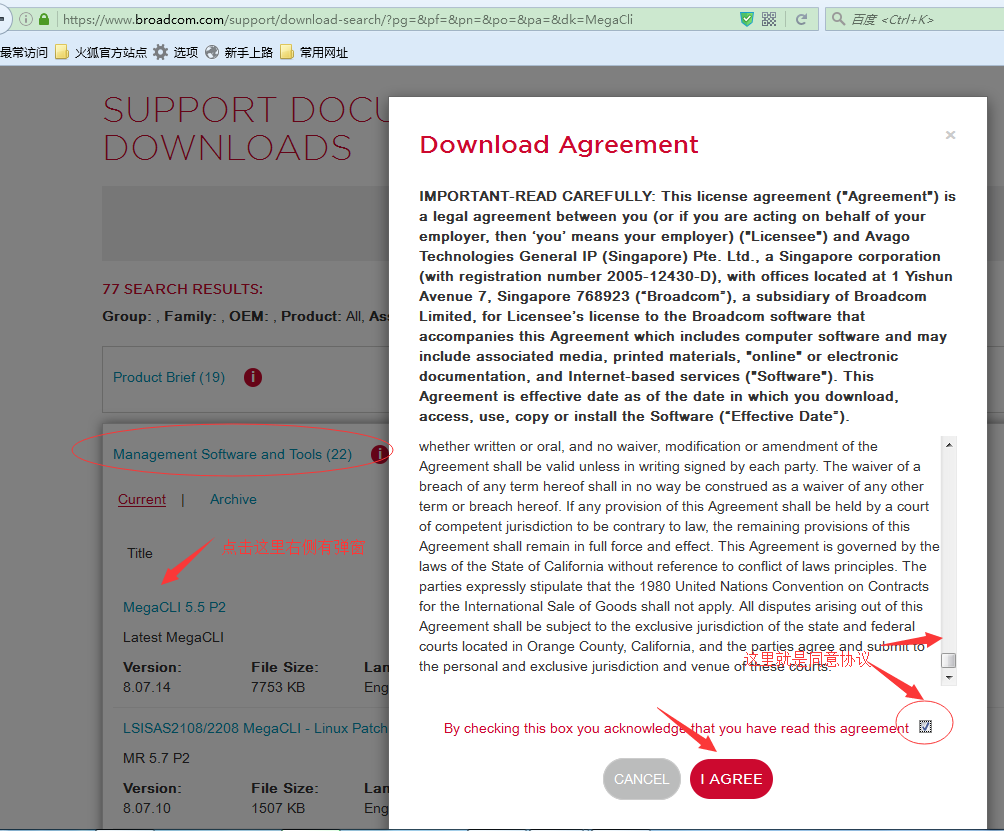
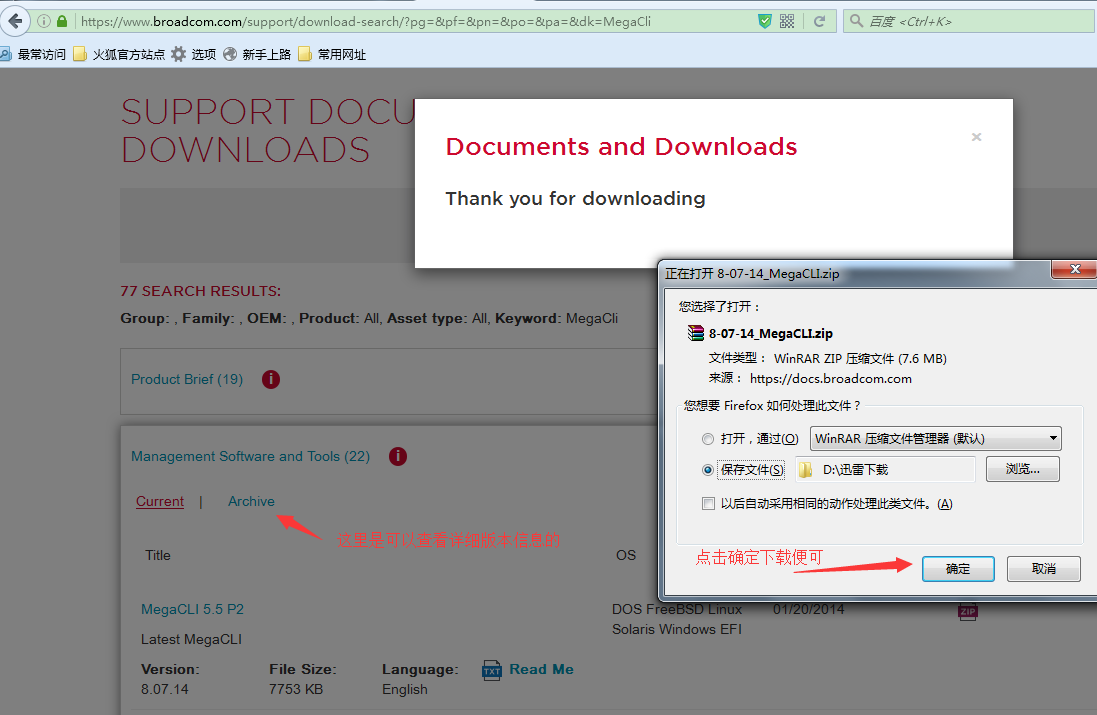
好了安装包已经下载下来了,这个zip包里面有不同系统的目录,我们找到Linux目录。
# rpm -ivh Linux/MegaCli-8.07.14-1.noarch.rpm #安装一下软件
# rpm -qa|grep MegaCli #查看包已经安装成功
MegaCli-8.07.14-1.noarch
# /opt/MegaRAID/MegaCli/MegaCli64 -help #可以查看版本以及相关的命令使用说明。默认命令装在了:/opt/MegaRAID/MegaCli/MegaCli64这里
#/opt/MegaRAID/MegaCli/MegaCli64 -cfgdsply -aALL|grep 'Product Name' #通过命令可以看出我们的RAID卡的型号为:PERC H730 Mini
Product Name: PERC H730 Mini
二、MegaCli命令罗列
#/opt/MegaRAID/MegaCli/MegaCli64 -LDInfo -Lall -aALL #查看raid级别
#/opt/MegaRAID/MegaCli/MegaCli64 -AdpAllInfo -aALL #查看raid卡信息
#/opt/MegaRAID/MegaCli/MegaCli64 -PDList -aALL #查看硬盘信息
#/opt/MegaRAID/MegaCli/MegaCli64 -AdpBbuCmd -aAll #查看电池信息
#/opt/MegaRAID/MegaCli/MegaCli64 -FwTermLog -Dsply -aALL #查看raid卡日志
#/opt/MegaRAID/MegaCli/MegaCli64 -adpCount #显示适配器个数
#/opt/MegaRAID/MegaCli/MegaCli64 -AdpGetTime –aALL #显示适配器时间
#/opt/MegaRAID/MegaCli/MegaCli64 -LDInfo -LALL -aAll #显示所有逻辑磁盘组信息
#/opt/MegaRAID/MegaCli/MegaCli64 -AdpBbuCmd -GetBbuStatus -aALL |grep 'Charger Status' #查看电池充电状态
#/opt/MegaRAID/MegaCli/MegaCli64 -AdpBbuCmd -GetBbuStatus -aALL #显示BBU状态信息
#/opt/MegaRAID/MegaCli/MegaCli64 -AdpBbuCmd -GetBbuCapacityInfo -aALL #显示BBU容量信息
#/opt/MegaRAID/MegaCli/MegaCli64 -AdpBbuCmd -GetBbuDesignInfo -aALL #显示BBU设计参数
#/opt/MegaRAID/MegaCli/MegaCli64 -AdpBbuCmd -GetBbuProperties -aALL #显示当前BBU属性
#/opt/MegaRAID/MegaCli/MegaCli64 -cfgdsply -aALL #显示raid卡型号,raid设置,disk相关信息
博文来自:www.51niux.com
三、常用命令详解
3.1 查看磁盘是否有问题:
#/opt/MegaRAID/MegaCli/MegaCli64 -PDList -aALL|grep Error
#这是查看所有磁盘信息的命令,然后grep错误信息,看下面过滤出来的信息,这是我一个R720的机器,有个磁盘有问题准备要更换呢。Media Error Count: 0 Other Error Count: 0 这两个数值来确定阵列中磁盘是否有问题;Medai Error Count 表示磁盘可能错误,可能是磁盘有坏道,这个值不为0值得注意,数值越大,危险系数越高,Other Error Count 表示磁盘可能存在松动,可能需要重新再插入。
Media Error Count: 0 Other Error Count: 1 Media Error Count: 98139 Other Error Count: 26672 Media Error Count: 0 Other Error Count: 0 Media Error Count: 0 Other Error Count: 0 Media Error Count: 0 Other Error Count: 0 Media Error Count: 0 Other Error Count: 0 Media Error Count: 0 Other Error Count: 0 Media Error Count: 4 Other Error Count: 68 Media Error Count: 0 Other Error Count: 1 Media Error Count: 0 Other Error Count: 0 Media Error Count: 2872 Other Error Count: 20 Media Error Count: 0 Other Error Count: 0
#当然实际生产环境中,如果想长期的检查磁盘是否可能要出问题了,还是建议去/var/log/message里面去检测信息,因为用MegaCli这种方式检测硬盘,当然硬盘出问题了可以报出来,但是就算你换了硬盘,再次检测会发现计数器还是没有清零,这是因为raid缓存的问题,但是这个问题需要重启服务器才能解决,所以说用这种方式做一个常规性的监控方式的话,这个问题还是要考虑进来的。
3.2 查看磁盘的缓存策略
#/opt/MegaRAID/MegaCli/MegaCli64 -LDGetProp -Cache -L0 -a0 #我这是DELLR730XD的服务器
Adapter 0-VD 0(target id: 0): Cache Policy:WriteBack, ReadAhead, Direct, No Write Cache if bad BBU
#L0表示磁盘组0, a0表示适配器号
#/opt/MegaRAID/MegaCli/MegaCli64 -LDInfo -LAll -aAll|grep 'Target'
Virtual Drive: 0 (Target Id: 0) Virtual Drive: 1 (Target Id: 1) Virtual Drive: 2 (Target Id: 2) Virtual Drive: 3 (Target Id: 3) Virtual Drive: 4 (Target Id: 4) Virtual Drive: 5 (Target Id: 5) Virtual Drive: 6 (Target Id: 6) Virtual Drive: 7 (Target Id: 7) Virtual Drive: 8 (Target Id: 8) Virtual Drive: 9 (Target Id: 9) Virtual Drive: 10 (Target Id: 10) Virtual Drive: 11 (Target Id: 11)
#下面是查看适配器的命令:
#/opt/MegaRAID/MegaCli/MegaCli64 -PDList -aALL|grep Adapter
Adapter #0
#结果为0,第一块raid卡适配器就为0,一般服务器就一个raid适配器,所以一般都是a0。
#/opt/MegaRAID/MegaCli/MegaCli64 -LDGetProp -Cache -LALL -aALL # 查看所有磁盘的缓存策略 ,我这是十二块硬盘
Adapter 0-VD 0(target id: 0): Cache Policy:WriteBack, ReadAhead, Direct, No Write Cache if bad BBU Adapter 0-VD 1(target id: 1): Cache Policy:WriteBack, ReadAhead, Direct, No Write Cache if bad BBU Adapter 0-VD 2(target id: 2): Cache Policy:WriteBack, ReadAhead, Direct, No Write Cache if bad BBU Adapter 0-VD 3(target id: 3): Cache Policy:WriteBack, ReadAhead, Direct, No Write Cache if bad BBU Adapter 0-VD 4(target id: 4): Cache Policy:WriteBack, ReadAhead, Direct, No Write Cache if bad BBU Adapter 0-VD 5(target id: 5): Cache Policy:WriteBack, ReadAhead, Direct, No Write Cache if bad BBU Adapter 0-VD 6(target id: 6): Cache Policy:WriteBack, ReadAhead, Direct, No Write Cache if bad BBU Adapter 0-VD 7(target id: 7): Cache Policy:WriteBack, ReadAhead, Direct, No Write Cache if bad BBU Adapter 0-VD 8(target id: 8): Cache Policy:WriteBack, ReadAhead, Direct, No Write Cache if bad BBU Adapter 0-VD 9(target id: 9): Cache Policy:WriteBack, ReadAhead, Direct, No Write Cache if bad BBU Adapter 0-VD 10(target id: 10): Cache Policy:WriteBack, ReadAhead, Direct, No Write Cache if bad BBU Adapter 0-VD 11(target id: 11): Cache Policy:WriteBack, ReadAhead, Direct, No Write Cache if bad BBU
#/opt/MegaRAID/MegaCli/MegaCli64 -LDGetProp -Cache -L0 -a0 #不同型号的服务器默认缓存策略也是不一样的,我这是dell FX2的服务器
Adapter 0-VD 0(target id: 0): Cache Policy:WriteThrough, ReadAheadNone, Direct, No Write Cache if bad BBU
#输出内容表示的意思:Adapter 0-VD 0(target id: 0): 为磁盘适配器号,0代表第一个,Cache Policy:后面是缓存策略
一:WriteBack与WriteThrough
1.WriteBack:进行写操作时,将数据写入RAID卡缓存,并直接返回,RAID卡控制器将在系统负载低或者Cache满了的情况下把数据写
2.WriteThrough:
二:
ReadAheadNone:
ReadAhead:
ReadAdaptive:
三、WT(Write
Write Policy(写入策略) 将高速缓存方法设置为回写或通过写。
* 在Write-through(通过写)高速缓存中,当磁盘子系统已接收到一个事务中的所有数据时,该控制器将数据传输完成信号发送给主机。
* 在Write-back(回写)高速缓存中,当控制器高速缓存已接收到某个事务中的所有数据时,该控制器将数据传输完成信号发送给主机。
Read-ahead(预读)启用逻辑驱动器的SCSI预读功能。 可将此参数设为No-Read-Ahead(非预读)、Read-ahead(预读)或Adaptive(自适应)。 默认设置为Adaptive(自适应)。
* No-Read-Ahead(非预读)指定控制器在当前逻辑驱动器中不使用预读方式。
* Read-ahead(预读)在读操作时,预先把后面顺序的数据加载入Cache,在顺序读取时,能提高性能,相反会降低随机读的性能。
* Adaptive(自适应)指定如果最近两次的磁盘访问出现在连续的扇区内,则控制器开始采用Read-ahead(预读)。 如果所有的读取请求都是随机的,则该算法回复到No-Read-Ahead(非预读),但仍要判断所有的读取请求是否有按顺序操作的可能。当Cache memory和IO空闲时,采取顺序预读,平衡了连续读性能及随机读的性能,需要消耗一定的计算能力。
Cache Policy(高速缓存策略) 适合在特定逻辑驱动器上读取。 它并不影响Read ahead(预读)高速缓存。
* Cached I/O(高速缓存I/O)指定所有读取数据在高速缓存存储器中缓存。
* Direct I/O(直接I/O)指定读取数据不在高速缓存存储器中缓存。 此为默认设置。 它不会代替高速缓存策略设置。数据被同时传送到高速缓存和主机。 如果再次读取同一数据块,则从高速缓存存储器读取
四、Write Cache OK if Bad BBU和 No Write Cache if Bad BBU
No Write Cache if Bad BBU: 如果BBU出问题,则关闭Write Cache。由WriteBack自动切换到WriteThrough模式。如果没有特殊要求,强烈建议采用该设置,以确保数据的安全。
Write Cache OK if Bad BBU: 如果BBU出问题,依然启用Write Cache. 这是不推荐的设置,BBU出问题将无法保证断电情况下数据的正常,如果此时依然采用WriteBack模式,遇到断电将发生数据丢失。除非有UPS作额外保证,不然不推荐采用这个设置。
博文来自:www.51niux.com
3.3 RAID卡策略的更改
修改WriteBack:
/opt/MegaRAID/MegaCli/MegaCli64 -LDSetProp -WB -Lall -aAll
修改WriteThrough:
/opt/MegaRAID/MegaCli/MegaCli64 -LDSetProp -WT -Lall -aAll
修改No Write Cache if Bad BBU:
/opt/MegaRAID/MegaCli/MegaCli64 -LDSetProp -NoCachedBadBBU -Lall -aAll
修改Write Cache OK if Bad BBU:
/opt/MegaRAID/MegaCli/MegaCli64 -LDSetProp -CachedBadBBU -Lall -aAll
或者其他:
/opt/MegaRAID/MegaCli/MegaCli64 -LDSetProp WT|WB|NORA|RA|ADRA -L0 -a0
/opt/MegaRAID/MegaCli/MegaCli64 -LDSetProp -Cached|-Direct -L0 -a0
3.4 在线创建raid阵列,删除阵列,查看进度
创建一个raid5阵列,由物理盘号为,3,4,5构成,该阵列的热备盘是物理盘号6:
/opt/MegaRAID/MegaCli/MegaCli64 -CfgLdAdd -r5 [32:3,32:4,32:5] WB Direct -Hsp[32:6] -a0
#r5代表的就是raid5,[32:5]里面32代表的是Enclosure Device ID,5代表的是Slot Number,WB和Direct缓存策略前面提到了,Hsp[32:6] 指定第七块物理硬盘为热备盘,a0表示陈列卡号。
在线更换raid0硬盘,原硬盘损坏。如盘号为5的硬盘损坏之前做了raid0,现在更换之后需要对新硬盘做raid0:
/opt/MegaRAID/MegaCli/MegaCli64 -DiscardPreservedCache -L5 -a0
#如果全是单盘raid0的话,清空磁盘组5的一般是第六块物理硬盘的raid缓存,不然就要重启服务器生效,L5是通过MegaCli64 -LDInfo -Lall -aALL得到的raid组对应的ID号,如Virtual Drive: 5 (Target Id: 5),ID号是从0开始的。
#/opt/MegaRAID/MegaCli/MegaCli64 -CfgLdAdd -r0 [32:5] -a0 #将盘号为5的硬盘做成raid0模式,其他参数使用默认。
清空所有的缓存:(一般不要这么干)
#/opt/MegaRAID/MegaCli/MegaCli64 -DiscardPreservedCache -Lall -a0 -NoLOG
阵列创建完后,会有一个初始化同步块的过程,可以看看其进度:
#/opt/MegaRAID/MegaCli/MegaCli64 -LDInit -ShowProg -LALL -aALL
以动态可视化文字界面显示 :
#/opt/MegaRAID/MegaCli/MegaCli64 -LDInit -ProgDsply -LALL –aALL
查看阵列后台初始化进度 :
#/opt/MegaRAID/MegaCli/MegaCli64 -LDBI -ShowProg -LALL -aALL
以动态可视化文字界面显示 :
#/opt/MegaRAID/MegaCli/MegaCli64 -LDBI -ProgDsply -LALL -aALL
查看某个物理磁盘重建进度:
#/opt/MegaRAID/MegaCli/MegaCli64 -PDRbld -ShowProg -PhysDrv [32:5] -a0
以动态可视化文字界面显示:
#/opt/MegaRAID/MegaCli/MegaCli64 -PDRbld -ProgDsply -PhysDrv [32:5] -a0
删除raid阵列:
#/opt/MegaRAID/MegaCli/MegaCli64 -CfgLdDel -L5 -a0 #删除阵列
3.5 其他的一些raid操作
指定第 5 块盘作为全局热备
#/opt/MegaRAID/MegaCli/MegaCli64 -PDHSP -Set [-EnclAffinity] [-nonRevertible] -PhysDrv[32:5] -a0
指定为某个阵列的专用热备
#/opt/MegaRAID/MegaCli/MegaCli64 -PDHSP -Set [-Dedicated [-Array1]] [-EnclAffinity] [-nonRevertible] -PhysDrv[32:5] -a0
删除全局热备
#/opt/MegaRAID/MegaCli/MegaCli64 -PDHSP -Rmv -PhysDrv[32:5] -a0
将某块物理盘下线/上线
#/opt/MegaRAID/MegaCli/MegaCli64 -PDOffline -PhysDrv [32:4] -a0
#/opt/MegaRAID/MegaCli/MegaCli64 -PDOnline -PhysDrv [32:4] -a0
手工配置初始化
#/opt/MegaRAID/MegaCli/MegaCli64 -LDInit -start –L0 -a0 #快速初始化
#/opt/MegaRAID/MegaCli/MegaCli64 -LDInit -start -full –L0 -a0 #完全初始化
#/opt/MegaRAID/MegaCli/MegaCli64 -LDInit -progdsply -L0 -a0 #显示初始化的进度
#/opt/MegaRAID/MegaCli/MegaCli64 -LDInit -abort -L0 -a0 #结束完全初始化
raid电池操作:
#/opt/MegaRAID/MegaCli/MegaCli64 -AdpBbuCmd -BbuLearn a0 #手动充电
#/opt/MegaRAID/MegaCli/MegaCli64 -AdpBbuCmd -GetBbuStatus -aALL #查看充电状态
#/opt/MegaRAID/MegaCli/MegaCli64 -AdpBbuCmd -GetBbuStatus -aALL #查看充电进度百分比
查看raid陈列中掉线的硬盘:
#/opt/MegaRAID/MegaCli/MegaCli64 -pdgetmissing -a0
查看Megacli的log
#/opt/MegaRAID/MegaCli/MegaCli64 -FwTermLog dsply -a0 > /tmp/Megacli.log
博文来自:www.51niux.com
3.6 查看磁盘的raid级别
RAID Level对应关系:
RAID Level : Primary-1, Secondary-0, RAID Level Qualifier-0 #RAID 1
RAID Level : Primary-0, Secondary-0, RAID Level Qualifier-0 #RAID 0
RAID Level : Primary-5, Secondary-0, RAID Level Qualifier-3 #RAID 5
如何判断一块硬盘是否做了raid呢?
#(新的机器可以通过下面命令来判断,之前的不太清楚,应为raid0和不做raid显示的信息很难判断)
#/opt/MegaRAID/MegaCli/MegaCli64 -LDInfo -LAll -aAll|grep 'Is VD emulated'
Is VD emulated : No #No就是没做raid
#/opt/MegaRAID/MegaCli/MegaCli64 -LDInfo -LAll -aAll|grep 'Is VD emulated'
Is VD emulated : Yes #yes就是做了raid
#如果是旧的服务器,如果我们上线服务器之前都会配置raid的话,一般会有名字,所以可以根据(但是这种方式也不是绝对的,可能不设置名称):
#/opt/MegaRAID/MegaCli/MegaCli64 -LDInfo -LAll -aAll|grep Name
Name :raid1 #有名字的说明做了raid系统 Name : #没有名字的说明就是一块裸盘 Name : Name : Name : Name :
博文来自:www.51niux.com
3.7 如何判断磁盘的raid级别:
双盘做了raid1的举例:
#/opt/MegaRAID/MegaCli/MegaCli64 -LDInfo -LAll -aAll
Adapter 0 -- Virtual Drive Information: Virtual Drive: 0 (Target Id: 0) Name :raid1 RAID Level : Primary-1, Secondary-0, RAID Level Qualifier-0 #通过RAID Level可以看到这是raid1的盘 Size : 278.875 GB #磁盘大小为300G State : Optimal #最佳状态 Strip Size : 64 KB Number Of Drives : 2 #2 说明是两块盘组成 Span Depth : 1 #说明实际只是raid 1
全盘做了raid5的举例:
#/opt/MegaRAID/MegaCli/MegaCli64 -LDInfo -LAll -aAll
Adapter 0 -- Virtual Drive Information: Virtual Drive: 0 (Target Id: 0) Name :raid5 RAID Level : Primary-5, Secondary-0, RAID Level Qualifier-3 #通过RAID Level 可以看出这是raid5 Size : 60.032 TB #总大小60T Sector Size : 512 Is VD emulated : Yes Parity Size : 5.457 TB #单盘大小是6T State : Optimal Strip Size : 64 KB Number Of Drives : 12 #由12块盘组成 Span Depth : 1 #深度为1
注:如果是做了热备盘的情况呢,再最下面会有两行信息:
Number of Dedicated Hot Spares: 1 #有1块盘做了热备
0 : EnclId - 32 SlotId - 11 #[32:11]盘做的热备
raid10的举例:
#/opt/MegaRAID/MegaCli/MegaCli64 -LDInfo -LAll -aAll
Virtual Drive: 1 (Target Id: 1) Name :raid10-01 RAID Level : Primary-1, Secondary-0, RAID Level Qualifier-0 Size : 556.929 GB #总大小600G State : Optimal Strip Size : 64 KB Number Of Drives per span:2 #表示每2个物理盘做成一个RAID1盘组 Span Depth : 2 #2个RAID1盘组做成了RAID10
3.8 raid的各种创建
对一台R720XD的服务器做下RAID演示一下(单盘2T,12个插槽):
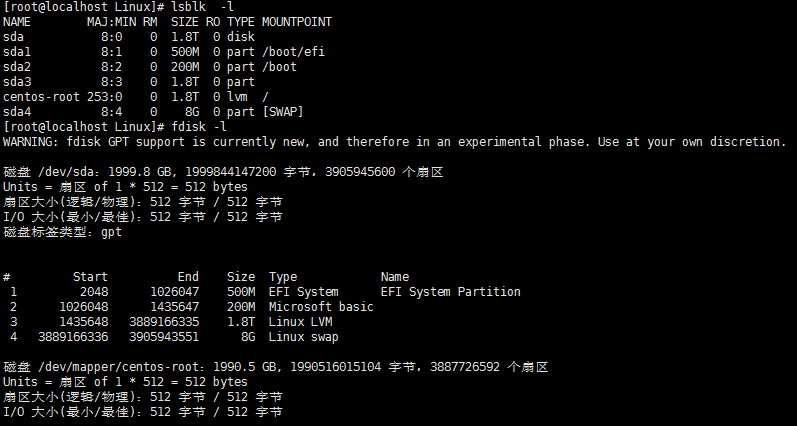
#这块服务器的特性就是不做硬盘不做raid,系统识别不到硬盘。
[root@localhost Linux]# /opt/MegaRAID/MegaCli/MegaCli64 -PDList -aALL |egrep "Enclosure Device ID|Slot Number"
#用命令查看一下可以看出,Enclosure Device ID为32,Slot Number是从0到11,也就是12块盘。
Enclosure Device ID: 32 Slot Number: 0 Enclosure Device ID: 32 Slot Number: 1 Enclosure Device ID: 32 Slot Number: 2 Enclosure Device ID: 32 Slot Number: 3 Enclosure Device ID: 32 Slot Number: 4 Enclosure Device ID: 32 Slot Number: 5 Enclosure Device ID: 32 Slot Number: 6 Enclosure Device ID: 32 Slot Number: 7 Enclosure Device ID: 32 Slot Number: 8 Enclosure Device ID: 32 Slot Number: 9 Enclosure Device ID: 32 Slot Number: 10 Enclosure Device ID: 32 Slot Number: 11
下面我们先对第三块盘,创建一个raid0.
# /opt/MegaRAID/MegaCli/MegaCli64 -CfgLdAdd -r0 [32:2] -a0
Adapter 0: Created VD 1 Adapter 0: Configured the Adapter!! Exit Code: 0x00
下面我们先对第四块和第五块盘,创建一个raid1
# /opt/MegaRAID/MegaCli/MegaCli64 -CfgLdAdd -r1 [32:3,32:4] -a0
Adapter 0: Created VD 2 Adapter 0: Configured the Adapter!! Exit Code: 0x00
下面我们再对第6,7,8块盘,创建一个raid5
# /opt/MegaRAID/MegaCli/MegaCli64 -CfgLdAdd -r5 [32:5,32:6,32:7] -a0
Adapter 0: Created VD 3 Adapter 0: Configured the Adapter!! Exit Code: 0x00
下面我们再对第9,10,11,12块盘,创建一个raid10
# /opt/MegaRAID/MegaCli/MegaCli64 -CfgSpanAdd -r10 -Array0[32:8,32:9] -Array1[32:10,32:11] -a0
Adapter 0: Created VD 4 Adapter 0: Configured the Adapter!! Exit Code: 0x00
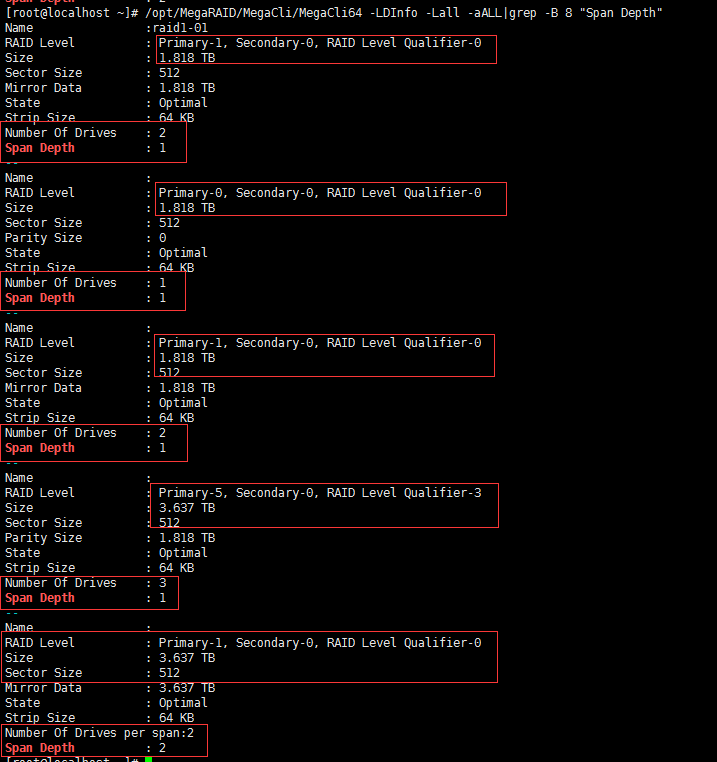
#从上图可以看出,我们做的raid级别
#第一个是raid1
#第二个是raid0
#第三个是raid1
#第四个是raid5
#第五个是raid10
3.9 删除RAID卷组实操演示:
# /opt/MegaRAID/MegaCli/MegaCli64 -LDInfo -Lall -aALL #首先先查看一下我们的系统RAID状态。
Virtual Drive: 1 (Target Id: 1) #带有Target标记的,Id:1,这个1就是我们所要删除的raid组的号。
# umount /data/ #这个raid是挂载到了/data目录,我们先解除挂载
# /opt/MegaRAID/MegaCli/MegaCli64 -cfgldde -L1 -a0 #上面不是查出id=1了嘛,就是指定a0适配器的,id为1的raid卷组删除.id=1上面是id=0.
Virtual Disk is associate with Cache Cade. Please Use force option to delete #这是说有缓存,要强制删除 Exit Code: 0x01
# /opt/MegaRAID/MegaCli/MegaCli64 -cfglddel -L1 -force -a0 #加上-force参数,再次删除
Adapter 0: Deleted Virtual Drive-1(target id-1) #提示删除成功。 Exit Code: 0x00
#另外:/opt/MegaRAID/MegaCli/MegaCli64 -cfgldde -a0 是将a0适配器所有的raid信息都清除掉。
博文来自:www.51niux.com
3.10 各种注
注一:
做raid之前可以用#smartctl -i 磁盘盘符 来过滤出要做raid的磁盘的Serial number:号跟 MegaCli64获得的磁盘信息进行匹配,确保盘符号无误。
注二:
在在线做raid的时候可能遇到一个问题:
问题:
The specified physical disk does not have the appropriate attributes to complete
the requested command.
Exit Code: 0x26
解决办法:
通过MegaCli64查看磁盘详细发现格式为:
Firmware state: JBOD #这种格式不支持直接做raid。
#MegaCli64 -PDMakeGOOD -Physdrv [32:8] -force -aALL #将磁盘格式转换一下
Adapter: 0: EnclId-32 SlotId-8 state changed to Unconfigured-Good. Exit Code: 0x00
#MegaCli64 -PDInfo -Physdrv [32:8] -a0 | grep -E "Enclosure Device|Slot Number|Firmware state"
Enclosure Device ID: 32 Slot Number: 8 Firmware state: Unconfigured(good), Spun Up #磁盘格式已经发生了变化,这种就可以做raid了
注三:
磁盘的空间和读写情况是我们比较关心的,有时候想测试数据对比一下的时候,如果想跳过一切缓存条件来进行裸盘测试的话,那硬盘也不应该做raid。但是现在R720xd,R730XD系列,不做raid的话,操作系统识别不到硬盘。
问题:
# MegaCli64 -PDMakeJBOD -PhysDrv[32:1] -a0 #我们将磁盘转换成JBOD模式,就可以直接被 可以直接被系统识别到。
Adapter: 0: Failed to change PD state at EnclId-32 SlotId-1.
Exit Code: 0x01
# MegaCli64 -AdpGetProp -enablejbod -aALL #查看失败的原因是默认是禁止向JBOD转换的,当然还有一种情况就是raid卡不支持了。
# MegaCli64 -PDList -aALL -Nolog|grep '^Firm' #查看一下,看到现在都是Spun Up模式
Firmware state: Online, Spun Up Firmware state: Unconfigured(good), Spun Up Firmware state: Unconfigured(good), Spun Up Firmware state: Unconfigured(good), Spun Up Firmware state: Unconfigured(good), Spun Up
# MegaCli64 -h|grep JBOD #查看一下如何开启JBOD模式
MegaCli -AdpSetProp -EnableJBOD -val -aN|-a0,1,2|-aALL val - 0=Disable JBOD mode. 1=Enable JBOD mode. | CopyBackDsbl | LoadBalanceMode | UseFDEOnlyEncrypt | WBSupport | EnableJBOD MegaCli -PDMakeJBOD -PhysDrv[E0:S0,E1:S1,...] -aN|-a0,1,2|-aALL
# MegaCli64 -AdpSetProp -EnableJBOD -1 -a0 #开启支持JBOD模式,如果这里失败后面的也就没法转换了。
Adapter 0: Set JBOD to Enable success. Exit Code: 0x0
# MegaCli64 -PDMakeJBOD -PhysDrv[32:2] -a0 #将某个磁盘转换为JBOD模式
注四:
磁盘做了raid0,如果涉及到硬盘的更换,如果只是这块硬盘热插拔,等你插上的时候会发现磁盘变为了,下面是idrac卡界面的显示:

#这是因为这块硬盘上面本身就有raid配置信息,然后你又插上了,raid卡就不识别了认为是一个外来硬盘。Foreign State: Foreign。
#如果就是这块硬盘硬盘做了个热插拔,那么可以执行:MegaCli64 -cfgforeign -Import -a0 #执行导入命令。
#如果这块硬盘是从别的raid卡上面拔下来的还有raid信息插上了需要在线清一下配置信息再创建呢,就下面的操作。
#MegaCli64 -CfgLdAdd -r0 [32:5] -a0 #现在直接创建肯定是不行的,会有下面的报错
The specified physical disk does not have the appropriate attributes to complete the requested command. Exit Code: 0x26
#MegaCli64 -pdinfo -physdrv [32:5] -a0 #可以单独查看一下这块盘的信息
Firmware state: Unconfigured(good), Spun Up #现在都是Spun Up模式 Foreign State: Foreign #硬盘被标记为“Foreign”外来配置,要清除一下 Foreign Secure: Drive is not secured by a foreign lock key
#MegaCli64 -cfgforeign -scan -a0 #扫描外来配置的个数
There are 1 foreign configuration(s) on controller 0. Exit Code: 0x00
#MegaCli64 -cfgforeign -clear -a0 #清除一下foreign配置
Foreign configuration 0 is cleared on controller 0. Exit Code: 0x00
#MegaCli64 -cfgforeign -scan -a0 #再次扫描外来配置的个数已经没有了
There is no foreign configuration on controller 0. Exit Code: 0x00
#MegaCli64 -pdinfo -physdrv [32:5] -a0 #再次查看下此块硬盘的信息
Firmware state: Unconfigured(good), Spun Up Foreign State: None
#MegaCli64 -cfgldadd -r0 [32:5] -a0 #然后将这块硬盘做成raid0
Adapter 0: Created VD 5 Adapter 0: Configured the Adapter!! Exit Code: 0x00
#MegaCli64 -ldinfo -L5 -a0 #已经可以看到这块盘的raid信息了。
Adapter 0 -- Virtual Drive Information: Virtual Drive: 5 (Target Id: 5) Name : RAID Level : Primary-0, Secondary-0, RAID Level Qualifier-0 Size : 278.875 GB State : Optimal Strip Size : 64 KB Number Of Drives : 1 Span Depth : 1
#MegaCli64 -pdinfo -physdrv [32:5] -a0 #可以再看下这块盘的磁盘信息
Firmware state: Online, Spun Up Foreign State: None
idrac卡界面查看:

#到此系统已经可以识别到这块硬盘了。
